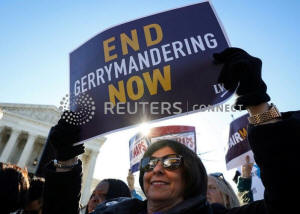|
Virginia Republicans lose in U.S. Supreme
Court racial gerrymandering case
 Send a link to a friend
Send a link to a friend
 [June 18, 2019]
By Lawrence Hurley [June 18, 2019]
By Lawrence Hurley
WASHINGTON (Reuters) - The U.S. Supreme
Court on Monday handed Republican legislators in Virginia a defeat,
leaving in place a ruling that invalidated state electoral districts
they drew because they weakened the clout of black voters in violation
of the U.S. Constitution.
The justices, in a 5-4 decision, sidestepped a ruling on the merits of
the case. They instead found that the Republican-led state House of
Delegates lacked the necessary legal standing to appeal a lower court
ruling that had invalidated 11 state House districts for racial
discrimination.
Virginia Attorney General Mark Herring, a Democrat and the state's top
law enforcement official, opposed the appeal and argued that the
Republican legislators were not entitled to act on behalf of the state
in the case. A new political map is being used for this year's state
elections.
"Virginia's elections this fall will take place in fair, constitutional
districts. It's a good day for democracy in Virginia," Herring wrote on
Twitter.

The Supreme Court's action let stand a 2018 ruling by a federal
three-judge panel that the 11 districts all violated the rights of black
voters to equal protection under the law under the U.S. Constitution's
14th Amendment.
The state's Republican-led House of Delegates "lacks authority to
displace Virginia's attorney general as representative of the state,"
Justice Ruth Bader Ginsburg wrote for the court's majority.
"In short, Virginia would rather stop than fight on. One house of its
bicameral legislature cannot alone continue the litigation against the
will of its partners in the legislative process," Ginsburg added.
The court was not split on ideological lines, with Ginsburg joined in
the majority by fellow liberal justices Elena Kagan and Sonia Sotomayor
as well as two conservative justices, Clarence Thomas and Neil Gorsuch.
The case involved a hot topic for the Supreme Court: a practice called
gerrymandering involving the manipulation of electoral district
boundaries to marginalize a certain set of voters and increase the
influence of others. In this case, the Republican legislators were
accused of racial gerrymandering to disadvantage black voters.
In two other major cases from Maryland and North Carolina, the justices
are considering whether courts can curb gerrymandering aimed at purely
partisan advantage. They are due to rule in those cases by the end of
this month.
At issue in the Virginia case was the state legislative map drawn by
Republicans after the 2010 national census.
[to top of second column]
|

Demonstrators protest during a Fair Maps rally outside the U.S.
Supreme Court, in Washington, U.S., March 26, 2019. REUTERS/Brendan
McDermid/File Photo

'SEEDS CONFUSION'
The National Republican Redistricting Trust, a group that backs
Republican efforts to redraw electoral districts, criticized the
ruling.
"It seeds confusion into a volatile, evolving body of law that
demands clarity just as the next redistricting cycle begins," said
Adam Kincaid, the group's executive director.
New electoral maps will be drawn nationwide following the 2020
census.
Since the Virginia maps that were challenged in the case were drawn,
Democrats have made gains in Virginia in both state and federal
elections. The current governor, Ralph Northam, and Herring, both
are Democrats. Northam has been involved in a racial controversy of
his own this year after a racist photo from his 1984 medical school
yearbook page surfaced.
"This is a welcome ruling from the Supreme Court - it's like I've
always said, voters should choose their representatives, not the
other way around," Northam said on Twitter.
Like other U.S. southern states, Virginia has a complicated racial
history dating back to the era of slavery.
The voters who brought the legal challenge accused Republicans of
packing black voters into certain state House districts to diminish
their voting power and make surrounding districts more white and
more likely to support Republicans.

Democrats have accused President Donald Trump's fellow Republicans
in Virginia and other states of crafting such legislative maps in a
way that crams black and other minority voters, who tend to favor
Democratic candidates, into certain districts in order to reduce
their overall sway in the state.
(Reporting by Lawrence Hurley; Editing by Will Dunham)
[© 2019 Thomson Reuters. All rights
reserved.]
Copyright 2019 Reuters. All rights reserved. This material may not be published,
broadcast, rewritten or redistributed.
Thompson Reuters is solely responsible for this content. |